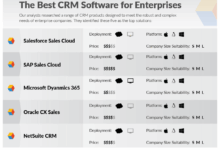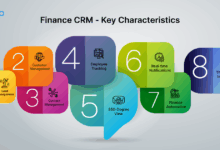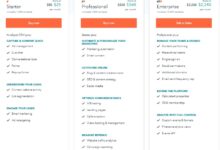CRM For Sales And Marketing Automation: Streamlining Business Operations
CRM for Sales and Marketing Automation introduces a powerful tool that revolutionizes how businesses manage customer relationships and drive sales. From integrating CRM with various marketing tools to optimizing data analysis, this topic delves into the essential aspects of leveraging CRM systems for enhanced efficiency and productivity.
Introduction to CRM for Sales and Marketing Automation
Customer Relationship Management (CRM) in the context of sales and marketing automation refers to the use of technology to manage interactions with current and potential customers. It involves organizing and analyzing customer data to improve relationships, drive sales, and increase customer retention.
There are several benefits of using CRM for sales and marketing teams. It helps streamline processes, improve communication, track customer interactions, and provide valuable insights for targeted marketing campaigns. By centralizing customer data, CRM enables teams to work more efficiently and effectively.
Popular CRM Software for Sales and Marketing
- Salesforce: A cloud-based CRM platform that offers a wide range of features for sales, marketing, and customer service.
- HubSpot CRM: An easy-to-use CRM system that integrates with marketing automation tools for seamless operations.
- Zoho CRM: Provides a customizable CRM solution with automation features to streamline sales and marketing processes.
Key Features of a CRM System for Sales and Marketing Automation
- Lead Management: Organizing and tracking leads throughout the sales process.
- Contact Management: Centralizing customer contact information for easy access.
- Reporting and Analytics: Generating insights from customer data to make informed decisions.
- Integration Capabilities: Connecting CRM with other tools like email marketing platforms for efficient operations.
CRM Data Analysis for Informed Decision Making
CRM data analysis involves extracting valuable insights from customer interactions, sales trends, and marketing campaigns. By analyzing this data, sales and marketing teams can identify opportunities, track performance, and optimize strategies for better results.
Training Sales and Marketing Teams on CRM Usage
- Providing comprehensive training on CRM features and functionalities.
- Offering hands-on practice sessions to familiarize teams with using CRM effectively.
- Continuous education and updates on new CRM features and best practices.
Key Features of CRM Systems
CRM systems offer a wide range of features designed to enhance sales and marketing automation processes, ultimately improving efficiency and productivity within an organization. Here are some essential features of CRM systems:
1. Contact Management
CRM systems provide a centralized database for storing and managing customer information, including contact details, interactions, and purchase history. This feature allows sales and marketing teams to access up-to-date information about leads and customers, enabling personalized communication and targeted marketing campaigns.
2. Lead Management
CRM systems help track and prioritize leads throughout the sales pipeline, from initial contact to conversion. By automating lead assignment, nurturing, and follow-up processes, organizations can efficiently move leads through the sales funnel, increasing conversion rates and revenue.
3. Opportunity Management
CRM systems enable sales teams to track potential deals and opportunities, including deal size, stage, and probability of closing. This feature helps sales representatives focus on high-value opportunities, optimize their sales strategies, and forecast revenue more accurately.
4. Workflow Automation
CRM systems streamline sales and marketing processes by automating repetitive tasks, such as sending follow-up emails, assigning leads, and generating reports. Automation reduces manual effort, minimizes errors, and ensures timely and consistent communication with prospects and customers.
5. Reporting and Analytics
CRM systems offer robust reporting and analytics tools to track sales and marketing performance, measure key metrics, and identify trends and opportunities. By analyzing data from various touchpoints, organizations can make informed decisions, optimize campaigns, and improve overall business outcomes.
Popular CRM Systems for Automation:
– Salesforce
– HubSpot CRM
– Zoho CRM
– Pipedrive
– Microsoft Dynamics 365
The Role of Customization in CRM Systems
Customization options in CRM systems allow businesses to tailor the platform to their specific needs, industry requirements, and workflows. By customizing fields, layouts, and workflows, organizations can adapt the CRM system to match their unique processes, terminology, and business goals, maximizing user adoption and efficiency.
Integration Capabilities with Other Tools
CRM systems often offer integration with other business tools, such as email marketing platforms, e-commerce systems, and customer service software. Seamless integration allows data to flow between different systems, enabling a unified view of customer interactions and streamlining cross-functional processes for enhanced collaboration and customer experience.
Pricing Structures and Alignment with Business Needs
Different CRM systems offer varying pricing structures, including subscription-based models, tiered pricing plans, and add-on features. Businesses should consider their budget, scalability requirements, and feature needs when selecting a CRM system. It’s essential to choose a CRM solution that aligns with the organization’s goals, growth plans, and budget constraints for long-term success.
Implementation of CRM in Sales and Marketing
Implementing CRM in sales and marketing teams involves a strategic approach to ensure successful adoption and integration.
Steps for Implementing CRM
- Assess Needs: Identify the specific requirements and goals for implementing CRM in your sales and marketing processes.
- Choose the Right CRM System: Select a CRM system that aligns with your business objectives and can effectively support your sales and marketing strategies.
- Customize and Configure: Tailor the CRM system to meet the unique needs of your sales and marketing teams, including custom fields, workflows, and reports.
- Provide Training: Ensure that all team members receive comprehensive training on how to use the CRM system effectively.
- Integration with Other Tools: Integrate CRM with existing sales and marketing tools to streamline processes and improve efficiency.
- Monitor and Evaluate: Continuously monitor the performance of the CRM system and gather feedback from users to make necessary adjustments.
Best Practices for Integration
- Alignment with Business Goals: Ensure that the CRM system supports the overall business objectives and enhances sales and marketing strategies.
- Collaboration with Teams: Involve sales, marketing, and IT teams in the implementation process to ensure seamless integration and adoption.
- Data Quality Assurance: Maintain data accuracy and consistency by establishing data quality standards and regular data cleansing processes.
- Automation of Routine Tasks: Automate repetitive tasks to free up time for sales and marketing teams to focus on more strategic activities.
Tips for Successful CRM Implementation
- Secure Executive Support: Gain buy-in from top management to ensure commitment and resources for the CRM implementation.
- Start Small and Scale: Begin with a pilot project or a phased approach to implementation before rolling out CRM across the entire organization.
- User Adoption Strategies: Implement user-friendly interfaces, provide ongoing support, and incentivize users to encourage adoption of the CRM system.
- Continuous Improvement: Regularly review and optimize processes, workflows, and data management to maximize the benefits of CRM for sales and marketing teams.
Data Management in CRM
Effective data management is crucial in CRM for sales and marketing automation as it helps businesses understand their customers better, personalize interactions, and improve overall customer experience.
Strategies for Data Collection, Organization, and Utilization
Implementing the right strategies for collecting, organizing, and utilizing customer data can significantly impact the success of sales and marketing campaigns. Here are some key strategies:
- Utilize online forms, surveys, and feedback mechanisms to collect relevant customer information.
- Segment data based on demographics, behavior, preferences, and interactions to tailor marketing campaigns accordingly.
- Integrate CRM with other tools and systems to ensure a centralized and up-to-date database for efficient data management.
Role of Data Analytics in Optimizing Campaigns
Data analytics plays a vital role in optimizing sales and marketing campaigns by providing valuable insights and metrics to measure performance and make data-driven decisions. Key aspects include:
- Utilizing predictive analytics to forecast customer behavior and trends for targeted marketing efforts.
- Implementing A/B testing to compare different campaign variations and identify the most effective strategies.
- Leveraging real-time analytics to monitor campaign performance and make adjustments on the fly for better results.
Customer Segmentation and Targeting
Customer segmentation and targeting are crucial aspects of marketing strategy, and CRM systems play a vital role in facilitating this process. By leveraging the data stored within CRM systems, businesses can categorize their customers into different segments based on various criteria such as demographics, behavior, preferences, and purchase history.
Benefits of Personalized Marketing Campaigns
Personalized marketing campaigns based on CRM data allow businesses to tailor their messages and offers to specific customer segments. This targeted approach not only enhances customer engagement but also increases the likelihood of conversion and customer retention. By understanding the unique needs and preferences of each segment, businesses can deliver more relevant and impactful marketing messages.
- Increased customer engagement and loyalty
- Higher conversion rates
- Improved customer satisfaction
- Enhanced brand perception
Successful Customer Segmentation Strategies
One example of a successful customer segmentation strategy using CRM is the RFM model, which segments customers based on their recency of purchase, frequency of purchase, and monetary value of purchases. By analyzing these metrics, businesses can identify high-value customers and tailor their marketing efforts accordingly.
Creating Customer Personas
Creating customer personas based on CRM data involves developing fictional representations of ideal customers within each segment. These personas help businesses better understand their customers’ motivations, preferences, and pain points, enabling them to create more targeted and effective marketing campaigns.
Customer personas provide a human touch to data-driven marketing strategies, allowing businesses to empathize with their customers and create more personalized experiences.
Role of Predictive Analytics
Predictive analytics plays a crucial role in customer segmentation using CRM by forecasting future customer behavior based on historical data. By leveraging advanced algorithms and machine learning techniques, businesses can anticipate customer needs, identify potential churn risks, and optimize marketing campaigns for maximum impact.
Automation in Sales Processes
Automating sales processes through CRM systems can significantly enhance efficiency and effectiveness in managing customer interactions. By streamlining repetitive tasks, tracking customer interactions, and providing valuable insights, CRM systems play a crucial role in optimizing sales workflows.
Impact of Sales Automation on Productivity and Revenue Generation
- Increased Efficiency: Automation eliminates manual data entry, allowing sales teams to focus on high-value tasks such as engaging with prospects and closing deals.
- Improved Accuracy: Automated processes reduce the risk of human error, ensuring that data is consistently updated and reliable.
- Enhanced Customer Insights: CRM systems provide valuable data analytics that help sales teams better understand customer behavior and preferences, leading to more targeted sales strategies.
- Accelerated Sales Cycles: Automation speeds up the sales process by automating follow-ups, reminders, and other tasks, resulting in quicker deal closures.
Examples of Automated Sales Workflows in CRM Systems
- Lead Scoring and Routing: CRM systems can automatically assign scores to leads based on predefined criteria and route them to the appropriate sales representatives for follow-up.
- Email Campaign Automation: Automated email campaigns can be triggered based on customer interactions, ensuring timely and personalized communication with prospects.
- Sales Forecasting: CRM systems use historical data and predictive analytics to generate accurate sales forecasts, helping sales teams make informed decisions.
Role of Artificial Intelligence in Enhancing Sales Automation
Artificial intelligence (AI) capabilities in CRM systems enable advanced features such as predictive lead scoring, chatbots for customer interactions, and personalized recommendations. AI enhances sales automation by analyzing vast amounts of data to identify patterns and trends, empowering sales teams to make data-driven decisions.
Comparison Between Traditional Sales Processes and Automated Sales Processes
- Traditional Sales Processes: Reliant on manual data entry, time-consuming tasks, limited visibility into customer data.
- Automated Sales Processes: Streamlined workflows, real-time data updates, personalized customer interactions, increased productivity and revenue.
Steps to Set Up an Automated Sales Workflow within a CRM Platform
- Define Sales Process: Identify key stages in the sales cycle and map out the workflow.
- Customize CRM Settings: Configure automation rules, triggers, and workflows based on sales requirements.
- Integrate Tools: Connect CRM system with other tools such as email marketing platforms for seamless automation.
- Train Sales Team: Provide training on using automated features and tools within the CRM platform for effective implementation.
Marketing Automation with CRM
Marketing automation is a powerful tool that, when integrated with CRM systems, can revolutionize the way businesses generate leads and nurture customer relationships. By automating marketing tasks and processes, companies can streamline their efforts and provide personalized experiences to their target audience.
Enhanced Lead Generation and Nurturing
- Integrating marketing automation tools with CRM systems allows businesses to track customer interactions and behavior, enabling targeted and personalized marketing campaigns.
- Automated lead nurturing workflows can be set up based on customer actions, ensuring timely and relevant communication to move leads through the sales funnel.
- Lead scoring capabilities in CRM systems help prioritize leads for sales teams, focusing on those most likely to convert, resulting in higher conversion rates.
Automated Marketing Campaigns Using CRM Data
- CRM data can be leveraged to create automated marketing campaigns that target specific customer segments based on their preferences, behavior, and past interactions with the company.
- Personalized content can be delivered at the right time through automated email campaigns, social media posts, and targeted advertisements, increasing engagement and conversions.
- Automated workflows can be triggered by customer actions, such as website visits or form submissions, ensuring timely follow-ups and nurturing relationships effectively.
Reporting and Analytics in CRM
Reporting and analytics play a crucial role in CRM for sales and marketing, providing valuable insights for decision-making and performance evaluation.
Types of Reports in CRM
- Performance Reports: These reports track sales performance, marketing campaign effectiveness, and customer engagement metrics.
- Forecasting Reports: These reports help predict future trends and outcomes based on historical data and current activities.
- Customer Segmentation Reports: These reports categorize customers based on behaviors, preferences, and demographics for targeted marketing efforts.
Key Performance Indicators (KPIs) in CRM Analytics
- Sales Revenue: Tracking revenue generated from sales activities.
- Conversion Rates: Monitoring the percentage of leads converted into customers.
- Customer Retention: Measuring customer loyalty and repeat business.
Data Collection and Processing in CRM Analytics
Data is collected from various sources such as customer interactions, website visits, and social media engagement. This data is then processed, cleaned, and analyzed to derive meaningful insights.
Importance of Data Visualization Tools
- Data visualization tools like charts, graphs, and dashboards help in presenting complex CRM analytics data in a visually appealing and easy-to-understand format.
- Visual representations enhance decision-making and communication of insights to stakeholders.
Customized Reports in CRM
- Users can set up customized reports in CRM systems by selecting specific data fields, criteria, and parameters to tailor reports according to their unique business needs.
- Customized reports provide detailed insights into specific aspects of sales and marketing performance, enabling targeted strategies and improvements.
Mobile CRM for Sales and Marketing Teams
Mobile CRM applications play a crucial role in empowering sales and marketing professionals to stay connected and productive while on the go. These tools provide a seamless way to access important customer data, track interactions, and manage tasks from anywhere, at any time.
Importance of Mobile CRM Applications
Mobile CRM applications offer several benefits for sales and marketing teams. Some key advantages include:
- Instant Access: Sales reps can quickly retrieve customer information, update records, and view sales data on their mobile devices, enabling them to make informed decisions on the spot.
- Improved Communication: By having access to real-time data, marketing teams can collaborate more effectively and tailor their campaigns based on the latest insights.
- Enhanced Productivity: Mobile CRM streamlines workflows and eliminates the need for manual data entry, saving time and increasing overall efficiency.
Features of Mobile CRM Solutions
Mobile CRM solutions come equipped with specific features designed to optimize sales and marketing processes on the go. Some examples include:
- Mobile Task Management: Allows users to create, assign, and track tasks while on the move, ensuring nothing falls through the cracks.
- GPS Integration: Enables sales professionals to access customer locations, plan routes efficiently, and optimize field sales activities.
- Offline Access: Supports offline access to critical data, ensuring that sales and marketing teams can continue working even in areas with poor network connectivity.
Integration with Other Tools and Platforms
Integrating CRM systems with other sales and marketing tools can enhance efficiency and streamline processes. By connecting CRM with external platforms, businesses can leverage data from multiple sources to improve customer relationships and drive better outcomes.
Benefits of Integration
- Improved data accuracy and consistency across platforms
- Enhanced communication and collaboration between sales and marketing teams
- Seamless access to customer information for personalized interactions
- Efficient tracking of customer interactions and engagement metrics
Common Integrations
Some common integrations include:
- Email Marketing Platforms: Integration with tools like MailChimp or Constant Contact for targeted email campaigns
- Social Media: Connecting CRM with platforms like Facebook or LinkedIn for social selling and customer engagement
- Analytics Tools: Integration with Google Analytics or Tableau for tracking and analyzing customer data
Tips for Seamless Integration
- Define clear objectives and requirements before integrating CRM with external platforms
- Choose integration tools that offer robust synchronization capabilities
- Train employees on how to use integrated tools effectively
- Regularly monitor and evaluate data synchronization to ensure accuracy
Customer Support and Service Automation
Customer support and service automation play a crucial role in enhancing customer satisfaction and loyalty. CRM systems are designed to streamline and automate various aspects of customer service to ensure timely and efficient resolution of issues.
Automating Customer Interactions
- CRM systems help in automating customer interactions through various channels such as email, chatbots, and social media platforms. This ensures that customer queries are addressed promptly and efficiently.
- By automating routine customer service tasks such as ticketing, routing, and escalation, CRM systems enable customer support teams to focus on more complex issues that require human intervention.
- Automated follow-up processes in CRM systems ensure that customers receive timely updates and resolutions to their queries, leading to improved satisfaction levels.
Enhancing Support Processes
- CRM systems provide a centralized platform for managing customer interactions, enabling support agents to access relevant customer information and history quickly. This leads to personalized and efficient support services.
- Automation in service processes such as case management, knowledge base access, and self-service options empower customers to find solutions to their issues independently, reducing the workload on support teams.
- Automated workflows in CRM systems help in routing customer inquiries to the right support agent based on skills and availability, ensuring that each customer receives the necessary assistance promptly.
Examples of CRM Automation in Customer Service
- Automated email responses to customer queries based on predefined templates and triggers.
- Chatbots integrated into CRM systems to provide instant responses and solutions to common customer issues.
- Automated ticketing systems that prioritize and route customer inquiries to the appropriate support agents for resolution.
Scalability and Customization of CRM Systems
When it comes to CRM systems, scalability and customization are crucial factors that can make a significant difference in meeting the evolving needs of sales and marketing teams. Let’s delve into how these aspects play a vital role in optimizing CRM solutions.
Scalability of CRM Systems
Scalability refers to the ability of a CRM system to grow and expand seamlessly as the business requirements and data volume increase. Here are some key points to consider:
- CRM systems should be able to handle a growing number of users, contacts, leads, and interactions without compromising performance.
- Scalable CRM solutions allow for easy integration with other tools and platforms, ensuring a smooth workflow and data flow.
- As the business grows, the CRM system should offer flexibility in terms of storage capacity, processing power, and customization options.
Customization Options in CRM
Customization plays a crucial role in tailoring CRM systems to meet specific business requirements and unique processes. Here’s why customization is essential:
- Customizable CRM systems enable organizations to adapt the platform to their specific workflows, data fields, and reporting requirements.
- By customizing CRM features like dashboards, reports, and automation rules, businesses can enhance productivity and efficiency.
- Tailored CRM solutions help in creating a personalized experience for users, resulting in better engagement and satisfaction.
Adapting CRM Systems to Evolving Business Needs
As business requirements evolve, CRM systems need to evolve as well to stay relevant and effective. Here’s how organizations can adapt CRM systems to changing needs:
- Regularly review and analyze the performance of the CRM system to identify areas for improvement and optimization.
- Stay updated with the latest CRM trends and technologies to leverage new features and functionalities that align with business goals.
- Collaborate with CRM vendors and experts to explore new customization options and integrations that can address changing business needs.
Security and Compliance in CRM
Data security and compliance are critical aspects of CRM systems, especially in the realm of sales and marketing automation. Ensuring the protection of sensitive information and adhering to regulations are paramount for maintaining trust with customers and avoiding legal repercussions.
Importance of Data Security and Compliance
- Protecting customer data: CRM systems store a vast amount of customer information, including contact details, purchase history, and preferences. Securing this data is essential to prevent unauthorized access and data breaches.
- Regulatory requirements: Various laws and regulations, such as GDPR and CCPA, mandate the protection of consumer data. Non-compliance can lead to hefty fines and damage to the organization’s reputation.
Best Practices for Maintaining Data Privacy
- Implementing encryption: Utilizing encryption techniques such as SSL/TLS protocols can safeguard data transmission and storage.
- Access controls: Setting up user permissions and role-based access ensures that only authorized personnel can view or modify sensitive information.
- Regular security audits: Conducting routine assessments helps identify vulnerabilities and weaknesses in the CRM system, allowing for timely remediation.
Examples of Security Measures in CRM Systems
-
Two-factor authentication
for enhanced login security.
-
Firewalls and intrusion detection systems
to monitor and prevent unauthorized access.
-
Data encryption at rest and in transit
to protect information from being compromised.
Role of Encryption and Access Controls
- Encryption plays a crucial role in securing sensitive data by converting it into a code that can only be deciphered with the right encryption key.
- Access controls restrict user permissions based on their roles within the organization, ensuring that individuals only have access to the data necessary for their job functions.
Regular Security Audits and Assessments
- Periodic security audits help identify vulnerabilities and gaps in the CRM system’s defenses.
- By conducting assessments regularly, organizations can proactively address security issues and enhance their overall data protection measures.
Future Trends in CRM for Sales and Marketing Automation
In the rapidly evolving landscape of sales and marketing automation, the future trends in CRM technology are crucial to stay ahead of the curve. Let’s explore some key predictions and insights shaping the future of CRM systems.
Impact of AI, Machine Learning, and Predictive Analytics
AI, machine learning, and predictive analytics are revolutionizing CRM systems by enabling advanced personalization and customer segmentation. These technologies analyze vast amounts of data in real-time to anticipate customer needs and behaviors, allowing for more targeted marketing campaigns and tailored sales strategies.
Evolution of CRM Platforms
CRM platforms are adapting to changing market demands by incorporating omni-channel communication, social media integration, and customer journey mapping. This evolution allows businesses to engage with customers across multiple touchpoints seamlessly, providing a holistic view of the customer journey.
Data Security and Privacy Features
With the increasing focus on data security and privacy, modern CRM systems are enhancing their features to comply with new regulations and meet consumer expectations. Strong encryption, permission controls, and data anonymization are becoming standard practices to safeguard sensitive customer information.
Last Recap
In conclusion, CRM for Sales and Marketing Automation offers a comprehensive solution for businesses looking to boost their sales and marketing strategies. By implementing CRM effectively, companies can streamline processes, improve customer relationships, and make data-driven decisions to stay ahead in today’s competitive market.




